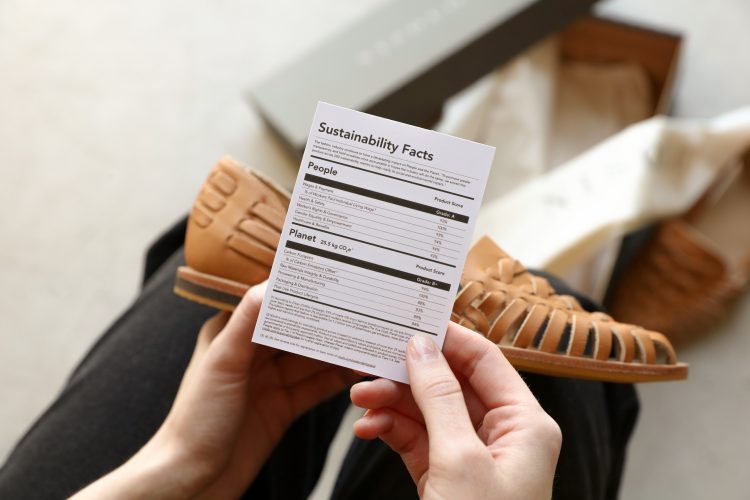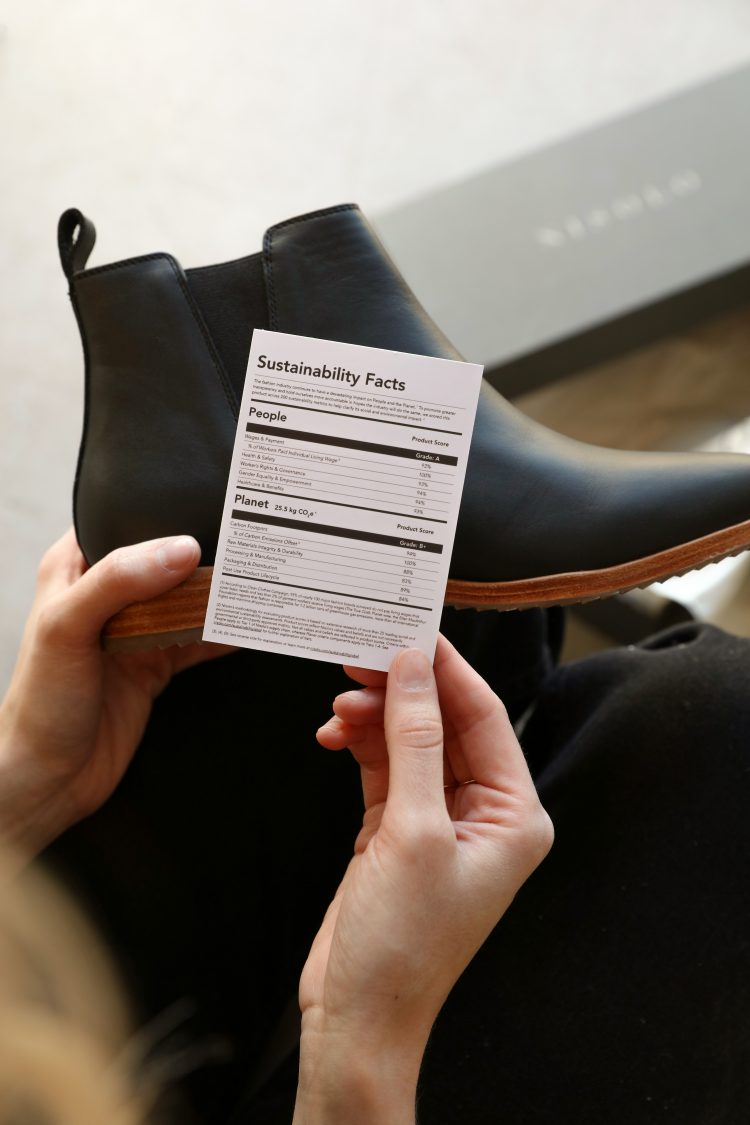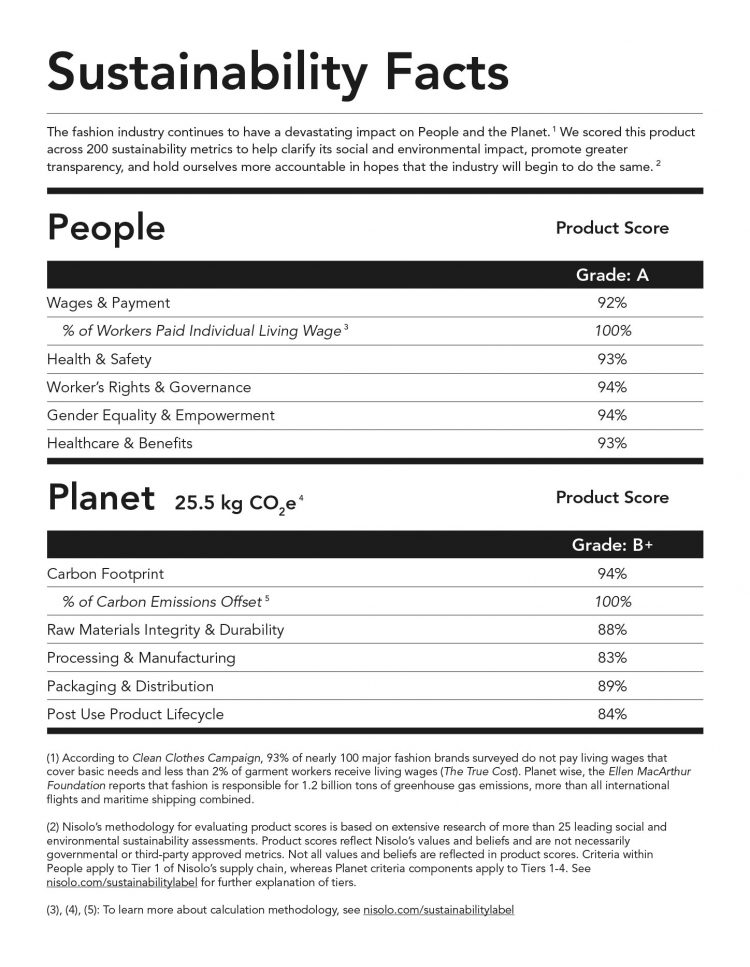Transparency In Fashion With Nisolo’s Sustainability Facts Label
Ready to expect greater transparency from fashion brands about the impact of their products on people and the planet? Learn more about Nisolo’s Sustainability Facts Label.

Slowly but surely, according to climate scientists, our planet is burning up. Like the proverbial frog slowly but unknowingly boiling to a crisp, humans are inducing our own pain of destroying the very planet we call home. Yet who is responsible? Who is causing the damage, and who must fix it?
An ongoing debate rages on to attach culpability of climate change and social injustice to individuals, corporations, or social systems and structures. In reality, all of those groups share responsibility. Corporations are responsible, but individuals run incorporations. Systems are broken, but individuals design, sustain, and perpetuate systems. And in truth, systems and corporations don’t change on their own. They only change with momentum from individual action, inside and outside the organization.

The Force of Individuals Shifts The Inertia of Organizations & Social Structures
The basic physics of inertia states that an object moving in one direction continues in such motion until another force pushes it in a different direction. Nothing changes course without energy asserting force to interrupt and shift the status quo. Individuals have that energy. Individuals are the forces that move and manipulate large companies, political entities, and massive social systems.
Many big companies and industries love to attribute responsibility for change solely to the individual actions and choices of the consumers. Fossil fuels, guns, drugs, fast fashion, opioids, unhealthy food, and more aren’t the problem. Individuals choosing to use, abuse, and consume these inanimate objects are the problem.

Knowledge Bears Power Which Bears Responsibility
While there are valid arguments on both sides of this conversation, organizations that make and sell these products have far more information about the impacts of the production and distribution of their products on the health and wellness of humans and all life on our planet than their consumers and customers.
The organizations have a wealth of knowledge and access to information. Knowledge bears power. And power bears responsibility.
I believe that individuals who represent these corporations and organizations, as well as individual consumers, share the responsibility to change the status quo. But those inside large entities often have access to larger budgets and channels for information to inform and impress change.
Giant organizations flush with multi-million budgets and rich with massive data on the supply chain, sales funnels, and social impact of their companies have a moral responsibility to be transparent. They have an ethical responsibility to inform individual consumers how their actions are perpetuating the flywheel of destruction, to the extent that corporations and organizations have such information available.
Yet many companies keep this information close to their chest. They understand that transparency may reduce sales. Disclosure decisions are often driven by bottom-line profit targets instead of ethical guardrails. In short, they are passing along to individual consumers the social responsibility to drive change without passing along the information to make informed decisions about such actions. They want to have their cake and eat it too.
We know that in some circumstances, certain of these companies and industries even go so far as to intentionally muddy the information waters with disinformation campaigns and shady political lobbying through channels like disingenuous industry groups and “advocacy” organizations. They pass the blame to consumers while also burdening them with misleading and false information on which to make decisions.
The individuals running large organizations and in decision-making positions that influence social structures, like government officials, also have a responsibility to use the information at their disposal to inform business and political decisions at the companies and in government organizations where they work and lead. Individual action rests with consumers and organizational decision-makers, and we need more transparency and accountability to share relevant data and impact information with as many people as possible.

Nisolo’s Sustainability Facts Label + Commitment To Transparency
Nisolo took one step toward creating transparency and accountability for the fashion industry while also providing fashion consumers with more reliable and transparent information on which to base their purchasing decisions. Nisolo released their Sustainability Facts Label, a simple label on each item they produce that discloses the impact of that product on people and our planet.
Nisolo is a fashion brand that makes shoes and accessories. But Nisolo is more than just a run-of-the-mill fashion brand.
Nisolo is a Certified B Corporation that is Climate Neutral Certified and places people and the planet at the core of their corporate responsibilities. They have stellar transparency about their supply chain and their products on their website. They pay living wages to their artisan makers.
They have an extensive Supplier Code of Conduct that covers wages, safety, worker’s rights, and more. They consider the environmental impact of each aspect of their business from raw materials to supply chain to packaging to the end-of-use lifecycle for their products. While many companies pay lip service to these priorities, Nisolo stands behind their commitment with much more significant action and policy.
The Sustainability Facts Label is another step in their pursuit of industry-leading social responsibility for the company.

I’ve been wearing Nisolo shoes and accessories for years. I got my first pair of Nisolo earrings shortly after I began my transition to more sustainable and socially responsible fashion habits. At the time, the company was quite small, and I received a handwritten thank-you note with my earrings.
I own a pair of Nisolo sandals that have been a staple in my summer wardrobe for years. They’re still in practically new condition, and they go with so many things I own. They’re my go-to pair of sandals for so many occasions in warm weather.
Nisolo makes good stuff, and they make it well.

Making Radical Transparency The Norm
Since then, Nisolo has expanded its product offering and grown significantly. With that growth, they have taken on the admirable challenge of making transparency fashionable in the industry.
Nisolo’s Sustainability Facts Label release also includes the open-source methodology the company developed to help other fashion brands rapidly accelerate increased transparency in the industry. While Nisolo recognizes this label is not perfect, it’s far better than any current level of consistent transparency available to consumers today.
The Sustainability Facts Label methodology to assess a product’s impact on People and Planet covers 10 different categories across 200 data points. The label itself, however, focuses on simple and digestible disclosure to consumers. In other words, the data input into the framework is comprehensive while the disclosure output on the Sustainability Facts Labels is cohesive and concise.


Give Consumers Information To Make Informed Decisions
Nisolo is still a small company in the grand scheme of the multi-billion dollar international fashion space. Just like individuals can’t solve social and climate justice matters alone, neither can Nisolo solve this problem as an individual organization.
However, consumers can encourage other brands to follow suit and pressure large brands, in particular, to use the vast mountains of data they have to be better stewards to people and the planet and give individuals better tools to use their fashion dollars for good.
Corporations aren’t responsible for solving climate change and social inequality on their own. Individuals aren’t solely responsible either. But efforts like Nisolo’s Sustainability Facts Label help connect the data and information that corporations have with the consumers making purchasing decisions that ultimately inform corporate and regulatory actions.
Some companies, like Nisolo, prioritize transparency and accountability. Other companies and their lobbyists will pump millions of dollars into stifling such transparency. But as consumers, we can push brands to use disclosure tools like Nisolo’s Sustainability Facts Label to highlight with each purchase how fashion choices impact People and the Planet. And hopefully, when more people see the impact of their shopping with each purchase, they will reconsider from whom and how to often to replenish their wardrobe.
Note: I have supported Nisolo through my content on Honestly Modern and have been a customer for more than five years. I am also an affiliate for Nisolo (which is part of the reason they reached out to let me know about the launch of this label). If you make a purchase through links in this post, Honestly Modern may earn a small commission from Nisolo. However, all opinions are my own and are not influenced in any way by the brand. Aside from being an affiliate, I was not paid to share this information.


Jen Panaro
Jen Panaro, founder and editor-in-chief of Honestly Modern, is a self-proclaimed composting nerd and advocate for sustainable living for modern families. To find her latest work, subscribe to her newsletter, Stepping Stones.
In her spare time, she’s a serial library book borrower, a messy gardener, and a mom of two boys who spends a lot of time in hockey rinks and on baseball fields.
You can find more of her work at Raising Global Kidizens, an online space to help parents and caregivers raise the next generation of responsible global citizens.








This is really a great article I really like and will definitely share it widely with my friends, wish you always have good health and make more articles in the future. thank you